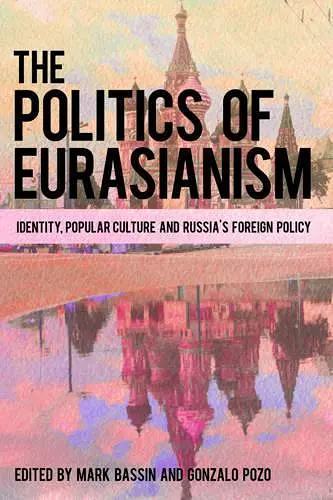The Politics of Eurasianism
Identity, Popular Culture and Russia's Foreign Policy
Mark Bassin editor Gonzalo Pozo editor
Format:Hardback
Publisher:Rowman & Littlefield International
Published:27th Jan '17
Currently unavailable, and unfortunately no date known when it will be back
This hardback is available in another edition too:
- Paperback£45.00(9781786601629)

In the course of Vladimir Putin’s third presidential term, many of the doctrines and ideas associated with Eurasianism have moved to the center of public political discourses in Russia. Eurasianism, both Russian and non-Russian, is politically active —influential and contested— in debates about identity, popular culture or foreign policy narratives. Deploying a variety of theoretical frameworks and perspectives, the essays in this volume work together to shed light on both Eurasianism’s plasticity and contemporary weight, and examine how its tropes and discourses are appropriated, interpreted, modulated and deployed politically, by national groups, oppositional forces (left or right), prominent intellectuals, artists, and last but not least, government elites. In doing so, this collection addresses essential themes and questions currently shaping the Post-Soviet world and beyond.
A rich, multi-faceted and up-to-date introduction to the generally anti-Western body of thought known as “Eurasianism”. With Slavophile roots, Eurasianism saw the lands of the Russian and Soviet Empires as having a distinctive civilization. Taken up rhetorically by Putin, modern Eurasianism is extremely diverse, as it is caught between old imperial ambitions and regional patriotisms. -- David Christian, Professor, Macquarie University, Sydney, Australia
Since 1991, the Russian Federation has been in search of a new national identity and global role, to conflicted and complex results. In this helpful new book, a team of experts address the ideological debates round the key concept of Eurasianism, and their roots in Russian thought, as well as their parallels in Central Asian, Turkish, and German history and contemporaneity. The result is a uniquely full and sophisticated picture of a body of thinking that is essential to understanding the region and its future. -- Catriona Kelly, Professor of Russian, University of Oxford
Bassin and Pozo’s The Politics of Eurasianism is an outstanding achievement, bringing together some of the world’s leading scholars in the field to analyse the power of the Eurasianist discourse – based on the perceived commonalities of the territories of Russia’s former empire in opposition to the West – not only to legitimise a range of domestic and foreign policy actions but also to shape post-Soviet cultural production. -- Richard Mole, Senior Lecturer in Political Sociology, School of Slavonic and East European Studies, University College London
Eurasianism is a notoriously slippery concept, but Bassin and Gozo’s volume shows how Eurasianist tropes form a lingua franca for political actors both within the post-Soviet space and without. As Moscow emerges as a regional hegemon and the lodestar for populist movements around the West, The Politics of Eurasianism provides clarity to a misunderstood issue. -- Timothy Nunan, Freidrich Meinecke Institute of History, Freie Universität Berlin
Developments of post-Soviet Eurasia, ranging from the evolution of Russia as a nation that is undergoing a major strategic transformation, to its remembrance as a global centre of geopolitical influence, to dramatic developments in Ukraine, stability of Central Asia, and others have gained attention. The Politics of Eurasianism is a timely comprehensive collection of essays aimed at offering an in-depth analysis of the philosophical and socio-cultural underpinnings of the complex processes associated with Russia's search of its own strategic identity and its missionary role within Eurasia and beyond. It offers a different angle at examining Russia's behaviour vis-a-vis Ukraine and the question of Eurasian idea and Eurasian identity. This is a must-read for scholars and students with interests in post-Soviet politics, post-communist societies, studies of nationalism and national identity. -- Alexey D Muraviev, Head, Department of Social Sciences and Security Studies, Curtin University, Western Australia
ISBN: 9781786601612
Dimensions: 236mm x 161mm x 33mm
Weight: 735g
384 pages